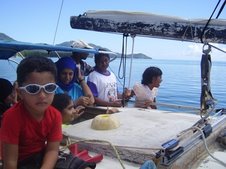| By Smriti Daniel. Pic by Saman Kariyawasam. They rant and rave, they wax lyrical, they crack each other up; they spout poetry, abuse and sympathy; they analyse politics, plays and personal problems; they post videos, photographs and racy limericks. Acclamations and insults are exchanged under anonymous and unlikely pseudonyms as more and more people join the fray, choosing sides, forming allies. The keyboards click, the screens flicker, as comment after comment follows post after post. These are ordinary people made extraordinary by the revolution they lead. After all, it has already begun to change forever how we see our world. Welcome to the Blogosphere. It all began not so long ago when in December 1997 Jorn Barger coined the term weblog to describe the process of “logging the web” as he surfed. By mid-1999 the weblog had not only become quite simply a ‘blog’ it had also gathered a small but devoted following – a following that would soon turn into a multitude numbering in the tens of millions. One of the more popular blogging sites – Blogger.com explained: “A blog is a personal diary. A daily pulpit. A collaborative space. A political soapbox. A breaking-news outlet. A collection of links. Your own private thoughts. Memos to the world” – in other words, whatever you wanted to make it. “Bloggers” now “blogged” about just about anything, using not only text, but pictures, videos and even audio and music elements to make their point.  | | Today Kottu is rife with debates and diatribes. | The blog’s popularity lies, at least in part, in its almost magical simplicity. With the click of a few keys you can instantly share whatever you choose with a vast audience; you can make your voice heard, make your opinion matter, be seen, turn celebrity, stand up and be counted – at least in theory. The technology is simple, you don’t need to be a computer wizard or internet geek. You don’t even have to know anything about graphics or the programmes that make these things run. Even better – sites like Blogger and Blogsome will set you up with your very own blog for free. It’s no wonder then that in the last few years hundreds of Sri Lankans have taken to blogging like so many fish to water. Kottu - a syndicated community of Sri Lankan weblogs – boasts a blog-roll nearly 200 entries long – and numbers continue to slowly grow every week. “Sri Lankan blogging truly came into its own after the 2004 Boxing Day tsunami,” says Ayeshea Perera, an undergraduate student at the University of Colombo who recently completed her thesis on blogging in Sri Lanka. She goes on to explain that “some bloggers such as Morquendi were able to send back news of badly affected areas that were as yet inaccessible to the mainstream media while other Sri Lankans chose to use blogging as a means of catharsis; a way in which to express their grief, shock and horror at what had happened.” Readers from around the globe logged on and some extracts from blogs were even featured in major international news networks. Suddenly Sri Lankan bloggers were getting global recognition. It was around that time that Indi Samarajiwa and Mahangu Weerasinghe put together Kottu – and the possibility of a Sri Lankan blogging “community” was born…the rest, to use the old cliché, is history. For Indi – who still acts as the site’s ‘janitor’ – Kottu is giving many a new blogger a chance to break in the easy way. “When I first began blogging four or five years ago, the only person who would read my blog was my mother,” he says ruefully, explaining that it used to take a long time for any blog to gather a following. In contrast, a blog on Kottu now, however new, has a pretty decent chance of being noticed immediately. For Indi as for Ayeshea, much of the charm of Kottu is simply in the way it brings people together. “The blogs on Kottu are so diverse – it’s a real mish-mash of personalities; and it is safe to say that a lot of these people may never have met let alone become friend, formed alliances etc. if not for the fact that they all blogged,” says Ayeshea. Today Kottu is rife with debates and diatribes on the subject of recent eviction of Tamil lodgers from the capital. Those arguing take both sides, speaking out with real fervour and conviction, often attempting to root themselves in measured objectivity or coherent analysis but sometimes simply just cutting loose. Commenting on the situation, Electra who has an established reputation for eloquent, passionate sarcasm blogged on Portrait: “Oh please, feed me another. As if this ‘back to where they came from’ rot isn’t the last thing this country needs. As if we can’t see that just by promoting the notion that these Tamils must ‘go back to where they came from,’ we’re strengthening the idea that this is not their country to begin with….” Indi – easily one of Sri Lanka’s most read bloggers - has comment threads that run for miles thanks to his thought provoking, unashamedly outspoken posts. In a post made awhile ago, he expanded on the idea of what living in a united Sri Lanka would really mean: “If you want a United Sri Lanka then you want to live with Tamil people. It means that you want them as neighbours, co-workers and friends. It means that you want to see their language and hear their music and eat their food and do all the fun and annoying things that come with living together. It means that they deserve the same security, rights and common decency as any fellow citizen. Both posts generated some heated debate, with bloggers coming out of the woodwork to make their opinions heard. Some comments were supportive, many were not. Some were altogether vicious and pointless. Not surprising really, considering that this is an open forum. But it does have you begging the inevitable question of who, if anyone, controls the blogs. Who stops someone from being abusive and violent? To take it a step further, how much of what you read can you really trust? The answer is very little according to Ayeshea. “You can pretty much write anything you want,” she says, however, “whether you get read or not, is another thing altogether.” Admitting that you have to be prepared for some very aggressive responses to your blog, particularly if it is a political topic, Electra says that tolerance is often key to staying a blogger. And a sense of humour always helps. As David Blacker, a regular on the now defunct Moju said in a post: “The short months here on Moju have been quite amusing. I’ve never actually been called a government stooge, a Tiger sympathiser, an NGO-backside kissing peacenik, a war criminal, as well as a jaded defeatist in such a short period before. Roll on.” Some communities do have rules for participant blogs, as Indi makes clear on the Kottu website. “In terms of libel, it’s basically not cool to personally attack people to the point of (seriously) threatening violence or publishing phone numbers, addresses, and revealing anonymous identities. There is a lot of rough and tumble on Kottu, but there is a grey line.” Now and then, the occasional bloggers nicknamed “Trolls” will inch towards that very same line – posting messages that are inflammatory, insulting, incorrect, inaccurate, absurd, or off-topic, intended to provoke a reaction from the others. Case in point being the notorious blog Pada Show which absolutely delights in mocking and reviling every blogger he/she comes across from a safely anonymous position. The anonymity which allows someone to say whatever they want also means many bloggers experiment with several online ‘personalities’. Blogger Agradevadutha freely admits to maintaining several different blogs ‘authored’ by entirely fictional characters. “It’s fun,” he says simply. While it’s obvious that the anonymity can be very liberating, blogs are far from being limited to mind games and angst ridden diaries. Increasingly, blogs are also serious sources of information and news. In Sri Lanka, the site ‘Groundviews’ allows aspiring ‘citizen’ journalists to cut right past mainstream media to discuss and analyse current events. “Groundviews has become a place people go to get news, views and perspectives that they can’t get anywhere else,” says Sanjana Hattotuwa, editor of the site. With nearly 30 registered contributors the site logs an average of 500 visitors every day – a number that only shoots up every time there is a newsworthy incident, he reveals. Here, as in Kottu, Trolls are given short shrift. Other bloggers find yet more innovative uses for their blogs. Tracy Holsinger, for instance, used her blog very effectively to promote her recent play ‘Chatroom’. Posts featuring pictures of the cast at their first dress rehearsal drew over 200 viewers. For Tracy and her fringe theatre company Mind Adventures this sort of publicity is invaluable, not least because big advertising budgets are still an impossibility. Nazreen Sansoni, Director of the Barefoot Gallery uses her Barefoot blog to publicise events, while husband Dominic Sansoni is one of many photographers including Alefiya Akberally, Yanik Tissera, Isuru Perera and Devaka Seneviratne who maintain photoblogs. Despite their increasing popularity, it will take blogs quite some time to go entirely mainstream in Sri Lanka. This is in most part because “a lot of things have to come together before a blogger is born… internet access, some knowledge of blogging, knowledge of English, etc,” explains Ayeshea. Though the time when the Sri Lankan blogging community will be a force to be reckoned with is still very much in the future, it’s obvious that they have already begun to take their first steps. “The voices are overwhelmingly young, vibrant and passionate,” says Sanjana and each and everyone revels in the freedom blogging gives them.
In the end, everyone has a different reason for blogging says Electra. For some it’s a love of writing, or a desire to keep up a political commentary; for others it’s the pleasure of being in the know or wallowing in the diverse personalities and opinions that the internet offers… “but it’s mostly because they feel secure with the unstinted freedom of expression,” she says, adding, “on your blog, you’re allowed to be yourself and express your mind, and you can rest assured that no one will disrespect that to an extent in which they have the power to take your space away, or forbid you from blogging ever again.” |




2 comments:
a worthwhile post! thanks for sharing
Assalamu Alaikum,
I am glad to see another Sri Lankan Muslim blogger. nice blog. keep on blogging.
Post a Comment